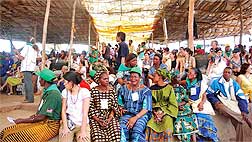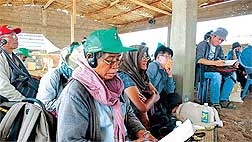Bangkok Post, 18 March 2007
Women delegates from all continents at the World Forum on Food Sovereignty renewed their commitment to self reliance in food and social justice, writes SUPARA JANCHITFAH

This open-air auditorium served as the venue for delegates from 98 countries to exchange their ideas and formulate their action plans to fight for food sovereignty.

Lamduan Serathong participated in one of the small forums of people from Southeast and East Asia to analyse the problems that farmers are encountering and what they can do about them.
Lamduan Serathong collected some of the African seeds that were left on the stage in front of the auditorium tent after the opening ceremony of the World Forum on Food Sovereignty. The Malian host had offered the seeds and some root crops as an offering to Mother Earth during the ceremony.
“I want to add more varieties of seeds in Thailand’s soil. I will plant some on my small plot of land, and if they grow well, I will distribute them to my neighbours and our networks,” said Lamduan, a mother of two and a former fisherwoman on the Moon River.
Lamduan had an offering of her own; she had carried with her some sweet tamarin seeds from Thailand and gave them to some of the conference participants and local Malians. She also planted some of the seeds at the training centre where the forum took place.
She showed delegates from other countries how to plant, water and nurture the seeds with organic fertilisers, using a mixture of her native Isan dialect and body language, which was probably more effective than any interpreter.
“I think they understand what I want to say, because most of us are farmers. To us farmers, seeds are very crucial for our lives – not something we have to sterilise and sell, ” she added with broad smile.
She was referring to the practices of transnational companies which try to patent seed types and sell sterilised versions so that farmers have to rely on the companies to sell them more seeds for the next year’s crop.
Lamduan and other farmers present at the forum were well-acquainted with the poignant experiences of farmers around the world who have little control, or sovereignty, over their own agricultural agendas.
More than 10,000 Indian cotton farmers have committed suicide in a recent years because they could not pay their debts after selling their cotton. Many factors led to this circumstance. The Indian government is under pressure to honour its committments under World Trade Organisation agreements and also international lenders to get rid of official subsidies. For the same reasons, it announced in 2005 that it was no longer committed to procuring cotton from local farmers.

Locals in Mali have their own way of cooking food.
“I feel sad that our seeds are now in the hands of corporations that prevent seed saving. In the past, seeds were a free resource, available just from the practice of farming. Why do we have to buy them? They are forcing us to open up our markets,” she said, adding that seed monopolies rob farmers of life.
Another indigenous woman at the forum, Atysheykarin Indigena Arhuaca from Colombia, told another seed-saving story of black slave women in South America.
Dating back around 1600 to 1700, the slaves who worked in the fields were not allowed to save seeds, but many women hid them in the braids of their hair. Some of these women were able to escape and return back to Africa, Atysheykarin explained, and they planted the seeds from South America in their ancestral lands on their home continent.
“To me, seeds mean not only food, but the freedom to grow food,” said Atysheykarin.
The story of Nyeleni
At the conference, women from around the world also learned of some of the problems that many African women face. For example, many indigenous women do not have the right to own property, although they are often the ones who must take care of it.
Despite abuse and discrimination toward women and poor people in general, the women who gathered at Mali know that there is no battle they cannot win if they are only willing to fight it.
The story of Nyeleni was told on the first day of the forum, February 22. Nyeleni was an only child, which in her part of Africa was considered a curse. She suffered in her youth from all the mocking she and her parents were subjected to by the men of the village. She secretly resolved to remove this slur that men had cast on her by defeating them on their own ground – farming and working the land.
Nyeleni’s first priority was not marriage, as is common for most young women, but to bring honour to her family and to women, all women. She took part in farming competitions and defeated all the champions in her village and in the surrounding region. Her reputation grew. The more arrogant men would still challenge her, but day after day they were all defeated, to their disgrace.
Nyeleni’s fame grew beyond the limits of her region, and she earned the respect of people from all walks of life. Her life story became a legend, and according to that legend, she domesticated the fonio, or “angry rice”, cereal that many people eat today.
The story of Nyeleni reinforced the spirits of the female delegates who have been fighting against patriarchy – a system that impoverishes life, resources and eco-systems – in their own homelands. They are also fighting against imperialism, neo-liberalism, neo-colonialism and the agents that promote such systems.
Lamduan and the other women at the forum are growing the seeds to foster the care of Mother Earth,. With their earnest commitment to work for their own food producing systems and policies that provide everyone with an adequate amount of healthy, affordable, and culturally appropriate food, these women hope to regenerate all the friendly ecosystems of the planet.
